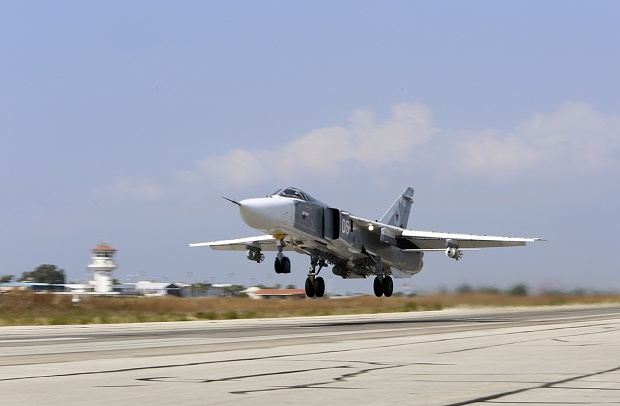US, Russia set rules for air safety over Syria

In this Oct. 3, 2015, file photo, a Russian SU-24M jet fighter armed with laser guided bombs takes off from a runaway at Hmeimim airbase in Syria. Russia and the United States signed an agreement Oct. 20 designed to minimize the risk of collisions and other dangers as both countries carry out airstrikes in Syria. AP
WASHINGTON, United States—The United States and Russia have signed a memorandum of understanding that establishes measures so their pilots steer clear of each other as they conduct separate bombing campaigns in Syria, the Pentagon said Tuesday.
READ: US, Russia to hold new Syria air safety talks—Pentagon
It’s a significant step that follows several instances in which Russian and US planes or drones have come close to each other, raising the nightmare prospect of a mid-air collision or some other dangerous encounter.
Speaking to reporters in the Pentagon, press secretary Peter Cook said the document had been signed earlier in the day and had taken effect immediately.
“There’s a series of protocols in place that effectively are intended to avoid any sort of risk of a mid-air incident between our air crews and Russian air crews,” Cook said.
Article continues after this advertisement“If they follow these protocols, we should not have the risk of engagement with Russian air crews over Syria.”
Article continues after this advertisementMoscow also reported that both countries had signed the memorandum of understanding (MOU), which boils down to some fairly standard air safety protocols.
Cook said these include guidelines on professional airmanship, as well as the use of radio frequencies and the creation of a secondary line of communication on the ground.
READ: Russia criticizes US for seeking ouster of Syria’s Assad
However, he was quick to stress that the understanding did not signal broader agreement with Russia’s Syria strategy to support President Bashar al-Assad.
“The MOU does not establish zones of cooperation, intelligence-sharing or any sharing of target information in Syria,” he said.
“We continue to believe that Russia’s strategy in Syria is counter-productive and their support for the Assad regime will only make Syria’s civil war worse.”
Crowded skies
The United States is leading a 60-plus member coalition targeting Islamic State of Iraq and Syria (ISIS) jihadists in Iraq and Syria and has been carrying out frequent raids for more than a year.
Russia also claims to be targeting ISIS and other “terrorists,” but the Pentagon says it is hitting non-ISIS rebels fighting forces loyal to Assad.
Implementation of the MOU follows a string of potentially serious incidents in the Syrian skies.
On one occasion, a coalition plane had to scrap a bombing run because Russian planes were already in the area.
Military spokesman Colonel Steve Warren said that last week, a Russian plane flew within 1,500 feet (450 meters) of two US planes.
CNN, which first reported the incident Tuesday, also said a Russian plane had flown within 500 feet (150 meters) of a US jet in another encounter. Warren was unable to immediately confirm that report.
“This should give our pilots—if the Russians abide by it—some measure of comfort that these kinds of incidents can be avoided altogether and that there’s no need for them to have an encounter if everyone is abiding by these rules,” Cook said.
Russian planes have also flown close to US drones. A video posted by the Russian Defense Ministry on YouTube on Tuesday appears to show the view from the cockpit of a Russian jet as it flies very close to a drone.
The Pentagon says Russia had initially asked for “deconfliction” talks with the United States after Moscow launched its air war in Syria on September 30.
US defense officials were furious after they only got a vague “heads-up” from Moscow about an hour before Russia began its bombing campaign.
Syria’s war has killed more than 250,000 people and forced millions from their homes since March 2011, recently sparking a mass migration of refugees that has raised tensions in Europe.